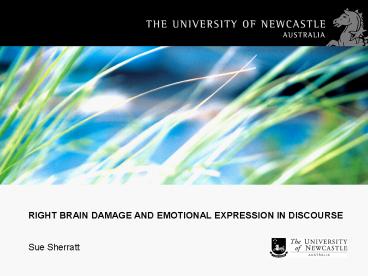RIGHT BRAIN DAMAGE AND EMOTIONAL EXPRESSION IN DISCOURSE - PowerPoint PPT Presentation
1 / 28
Title: RIGHT BRAIN DAMAGE AND EMOTIONAL EXPRESSION IN DISCOURSE
1
RIGHT BRAIN DAMAGE AND EMOTIONAL EXPRESSION IN
DISCOURSE
Sue Sherratt
2
- Verbal communication is ordinarily and normally
imbued with affective and attitudinal nuances
(Van Lancker Pachana, 1998, p. 311)
3
Why is evaluation important?
- Expresses speakers opinion about something (and
thereby values) - Constructs and maintains relations between
speaker and hearer - Organises the discourse
4
The role of evaluation in narratives
- wards off the question so what?.
- makes part of narrative prominent.
- distinguishes narratives from other stretches of
talk - allows the speaker to occupy the floor for longer
5
Right hemisphere emotion 2 hypotheses
- RH hypothesis RH is dominant for emotional
processing - Valence hypothesis RH is dominant for
unpleasant/negative emotions.
6
RBD and emotional expression
- Emotional expression may be verbal, nonverbal or
extralinguistic - RBD investigations focused mostly on nonverbal
and extralinguistic expression of emotion - Limited research into RBD and verbal expression
of emotion
7
Verbal expression of emotion and RBD
- Most studies have used rating scales.
- Rated as less emotionally intense, reduced in
emotionality, less accurate in emotions
expressed. - 2 studies of lexical emotional expression
reduction in emotional content and lower rate of
affect words.
8
Assessment of verbal emotion
- Complex can be explicit or implicit,
subjective, value-laden. - Tends to have been sidelined in linguistics
(Martin 2004) - Few relevant analysis procedures
9
Appraisal (Martin and colleagues)
- semantic resources used to negotiate emotions,
judgement and valuations, alongside resources for
amplifying and engaging with these evaluations
(Martin, 2000, p. 145). - Forms a prosody of attitude (Martin Rose,
2003, p. 54) through the sample.
10
Appraisal resources
- 3 categories/dimensions
- Appreciation
- Affect
- Judgement
- Amplification for grading the attitudes
11
Appraisal Categories
- Appreciation
- how speakers evaluate a text or a process
- What do you think of that?
- Affect
- how something makes them feel
- How do you feel about it?
12
Appraisal Categories contd
- Judgement
- evaluation of the ethics, morality or social
values of peoples behaviour - How would you judge that behaviour?
- Amplification
- how speakers grade their attitudes towards
people, things or events.
13
Questions
- Are speakers with RBD able to express emotion
verbally and to what extent? - What appraisal resources do they use to do this?
14
Participants
- community-dwelling British males
- monolingual English-speaking
- minimum of 10 years of education
15
7 RBD participants
- Pre-morbidly strongly right-handed
- Single right hemisphere CVA
- Aged 54-77
- TPO 2y6m to 5 y
16
10 NBD participants
- right-handed
- matched for age and SES to RBD group
17
Narratives
- 2 narratives of personal experience
- Tell me about a frightening/funny experience
that you have had at any time in your life
18
Total appraisal resources ( total words)
19
Total appraisal by topic (total words)
20
Appraisal resources used ( of total appraisal)
21
Appraisal by topic ( of total appraisal)
22
Appreciation affect ( of total appraisal)
23
Judgement amplification ( of total app)
24
Conclusions
- Relative, not absolute, differences between
groups - RBD tended to use less, particularly for negative
topic - On positive topic, RBD and NBD similar.
- On negative topic, RBD appraised things more than
expressing feelings
25
More questions than answers
- Effect of discourse genre?
- Specific/personally relevant negative topic?
- Other factors?
- Limitations of this study?
26
Final comments
- Attitudinal analysis will never be completely
clear-cut and are still being developed - Appraisal framework used has considerable merit
- Evaluation plays a constructive role in
organising sociality how we share feelings in
order to belong (Martin, 2004, p, 341).
27
RBD and social integration
- The difficulties of people with RBD in emotion
processing have marked effects on interpersonal
interactions (Lehman Blake, 2003). - People with RBD are considered to be
disconnected from the world around them (Myers,
1999) and as having a social handicap at least
as significant as aphasia (Paradis, 1998)
28
Thank you































